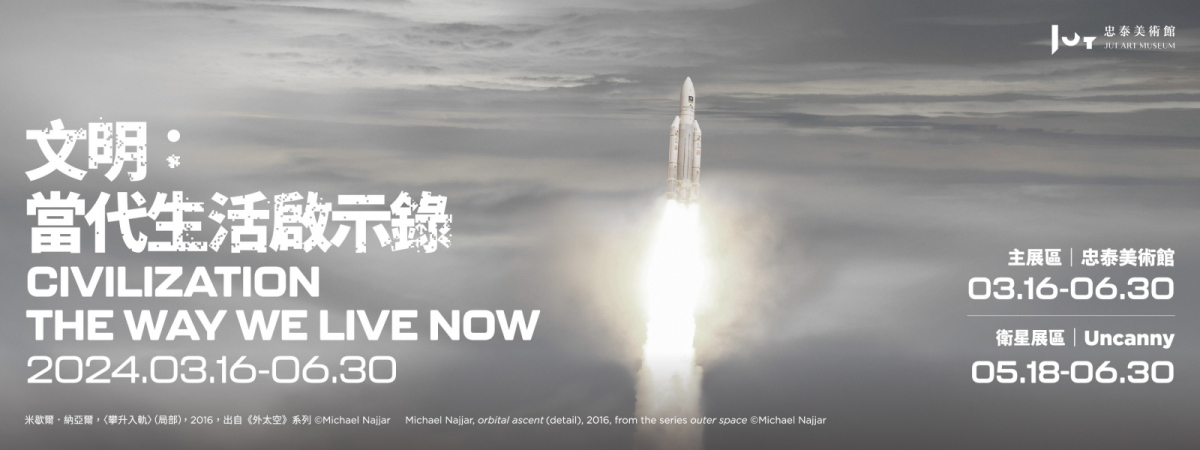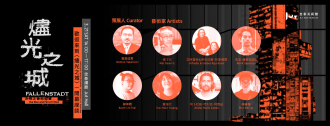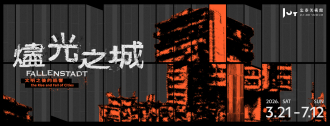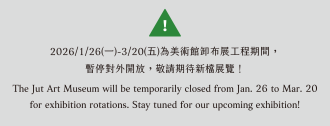Preface / Jut Art Museum
Photography, a manifestation of contemporary eyes, not only gazes at our civilization but also greatly illuminates our contemporary life.
Humankind is in an era of rapid progress, and human civilization is evolving, expanding, and mutating with an unimaginable force in this globalized world. The development and spread of images have rendered them part of our daily existence. Our ability to receive images is humbled by the sheer quantity and speed of their appearance before our eyes. No sooner did the camera shutter click, than a piece of the world was recorded in the picture. Photography is not so much a statement about the world as part of it, whether witnessed by our own eyes or viewed through photographic works. “Photographs, which cannot themselves explain anything, are inexhaustible invitations to deduction, speculation, and fantasy,” Susan Sontag wrote in her seminal book On Photography. Today, human civilization has fused with the fast-evolving medium of photography in an indisputable fashion and with an unprecedented degree of closeness to every dimension of our contemporary society.
Having toured seven cities since its debut at the National Museum of Contemporary Art, Korea in 2018, Civilization: The Way We Live Now is hosted by the Jut Art Museum in 2024. This exhibition has been co-produced by the Foundation for the Exhibition of Photography, Minneapolis/New York/Paris/Lausanne, and the National Museum of Modern and Contemporary Art of Korea in collaboration with the Jut Art Museum, Taipei. The Jut Art Museum, as the first museum in Taiwan focusing on issues about the “future,” seeks to comprehensively explore human civilization through this exhibition, by bringing together works by artists from around the world; to wit, this exhibition documents and interprets the development of contemporary human civilization via photographic art. “Photography” is tantamount to a mirror that reflects every aspect of human civilization and our life. From dwelling and traveling as well as ways of production and consumption to working, entertainment, thinking, creation, cooperation, and conflict, all of them are the fruits of human collective endeavors that highlight the complexity and contradictions of contemporary civilization.
This exhibition uses photographic art as a reminder of the events that have already occurred in our century or are about to take place on this planet, in an attempt to prompt extra attention and broader discussion. We also expect this exhibition to stimulate the visitors to contemplate the future of human life and the world, and how our contemporary civilization will be presented in the foreseeable future.
Exhibition Introduction / William A. Ewing (Curator)
We hurtle together into the future at ever-increasing speed — or so it seems to the collective psyche. We build our towers higher, we move ourselves faster and further, while our bodies are rebuilt and resurfaced. We manipulate our genes, determined to banish illness and old age. Our robots and cyborgs begin to walk, talk and think. Every day and every hour human civilization expands, evolves, mutates.
Still, the ingenious tools we devise also backfire. The financial storms, the weapons of mass destruction, the nature experiments gone wrong, the systems that explode or implode, climate degradation — all these threaten to tear the thin fabric of civilization. And concern is mounting for our highly technoscientific civilization’s more risky ventures: nanotechnology, genetic interventions, artificial intelligence and virtual reality — not to mention the nuclear demon, out of the bottle and still restless. Futurist James Martin warns: “this is the first century in which Homo Sapiens could be terminated. Even if Homo Sapiens survives, civilization may not.”
A number of civilizations people the earth, and more have in the past, but it is clear that a single, planetary civilization is slowly evolving. Consider Samsung and Apple, Airbus and Boeing, Mercedes and Hyundai, the Olympics Games and the World Cup (the former were seen by 3.2 billion people, half the world’s population!). Meanwhile we chat with friends and total strangers on other continents, and eagerly share pictures — billions of them.
We worship individual achievements in any area and what we tend to forget is just how collective our greatest achievements are! Antibiotics, the smartphone, the Internet, the Human Genome Project, the particle collider at CERN, the James Webb telescope, the World Health Organization and the Voyager spacecraft... Planetary Civilization is first and foremost a collective effort.
And what of photography? All over the world photographers are busy documenting and interpreting our multifaceted civilization — its strong points and its weak, its achievements and its failures. No past civilization can boast of such a vivid, detailed pictorial record. And if no one exhibition can hope to incorporate more than a fraction of this labor, at best it can provide a glimpse. Civilization: The Way We Live Now is both a homage to the human endeavor of the billions of beings who have created our world, as well as the countless photographers who work and live around us; they help us to evaluate who we are and where we are headed.
This exhibition has been co-produced by the Foundation for the Exhibition of Photography, Minneapolis/New York/Paris/Lausanne, and the National Museum of Modern and Contemporary Art of Korea in collaboration with the Jut Art Museum, Taipei.
- Exhibition|Civilization: The Way We Live Now
- Main Venue|Jut Art Museum (No.178, Sec. 3, Civic Blvd., Da'an Dist., Taipei City 106, Taiwan)
- Date|2024.03.16 SAT- 2024.06.30 SUN
- Opening Hours|TUE-SUN 10:00-18:00 (Closed on Mondays)
- Student Day|Free Admission once on WED (With valid student ID)
- Admission|General TWD 150, Concessions TWD 120 (Student, seniors aged 65 and above, and groups of 10 or more)
- Free Admission for the disabled and a companion, children aged 12 and under (Concessions or Free Admission upon presentation of valid proof)
- Satellite Venue|NOKE 3F Uncanny (No. 200, Lequn 3rd Rd., Zhongshan Dist., Taipei City 104053, Taiwan)
- Date|2024.05.18 SAT- 2024.06.30 SUN
- Opening Hours|SUN-THU 11:00-21:30, FRI-SAT 11:00-22:00
- Admission|General TWD 50 (Free Admission for the disabled and a companion, children aged 12 and under with valid identification)
- Organizer|Jut Art Museum
- Curatorial Team|Jut Art Museum, Foundation for the Exhibition of Photography, National Museum of Modern and Contemporary Art of Korea
- Event Partners|NOKE JUT RETAIL, ONIBUS
- Official Hotel Partner|Hotel Gracery Taipei
- Cultural Partner|eslite corporation
- Media Partners| The Reporter、MOT TIMES、500 times
- Satellite Venue - Event Partner|Atelier A Better Tomorrow
- Satellite Venue - Venue Partner|Uncanny
- Special Thanks|Avocado Art Lab
* This exhibition has been co-produced by the Foundation for the Exhibition of Photography, Minneapolis/New York/Paris/Lausanne, and the National Museum of Modern and Contemporary Art of Korea in collaboration with the Jut Art Museum, Taipei.
Artists:
* The list shows in alphabetical order by artists’ surnames
Main Venue(Jut Art Museum)
Max Aguilera-Hellweg, Andreia Alves de Oliveira, Murray Ballard, Olivo Barbieri, Mandy Barker, Olaf Otto Becker, Valérie Belin, Daniel Berehulak, Florian Böhm, Michele Borzoni, Priscilla Briggs, Paul Bulteel, Alejandro Cartagena, Philippe Chancel, Olivier Christinat, Lynne Cohen, Raphaël Dallaporta, Sergey Dolzhenko, Natan Dvir, Mitch Epstein, Andrew Esiebo, Adam Ferguson, Vincent Fournier, Andy Freeberg, Andreas Gefeller, Christoph Gielen, Ashley Gilbertson, Samuel Gratacap, Lauren Greenfield, Sean Hemmerle, Mishka Henner, South Siu Nam Ho, Candida Höfer, Dan Holdsworth, Hao Hong, Choon Man Jo, Chris Jordan, Mike Kelley, Irene Kung, Gjorgji Lichovski, Mauricio Lima, Sheng-Wen Lo, Pablo López Luz, Alex MacLean, David Maisel, Edgar Martins, Jeffrey Milstein, Mintio, Andrew Moore, Richard Mosse, Michael Najjar, Walter Niedermayr, Suntag Noh, Simon Norfolk, Cara Phillips, Sergey Ponomarev, Cyril Porchet, Mark Power, Giles Price, Reiner Riedler, Andrew Rowat, Gerco de Ruijter, Victoria Sambunaris, Shigeru Takato, Alec Soth, Henrik Spohler, Thomas Struth, Eric Thayer, Danila Tkachenko, Toshio Shibata, Richard de Tscharner, Andreas Tschersich, Brian Ulrich, Carlo Valsecchi, Cássio Vasconcellos, Reginald Van de Velde, Robert Walker, Richard Wallbank, Qing-Song Wang, Patrick Weidmann, Damon Winter, Michael Wolf, Paolo Woods and Gabriele Galimberti, Luca Zanier, Robert Renhui Zhao, Francesco Zizola
Satellite Venue(Uncanny Space)
Evan Baden, Olaf Otto Becker, Olivier Christinat, Roger Eberhard, Vincent Fournier, Nick Hannes, Sungpil Han, Pieter Hugo, Taedong Kim, Alfred Ko, Benny Lam, Alex MacLean, Ann Mandelbaum, Jeffrey Milstein, Walter Niedermayr, Trent Parke, Giles Price, Reiner Riedler, Dona Schwartz, Larry Sultan, Eason Ka Wai Tsang, Cássio Vasconcellos, Massimo Vitali, Dougie Wallace, Raimond Wouda, Xiao Zhang
Exhibition Team
Exhibition Supervisors|Aaron Y. L. Lee, Alex Y. H. Lee, Shan-Shan Huang (Jut Art Museum)
Guest Project Director|Todd Brandow (FEP)
Exhibition Coordinators| Ying-Peng Chen (Jut Art Museum), Justine Chapalay (FEP)
Assistant Coordinators|Yen-Hsiu Chen, Yu-Chen Tsai, Tsuei-Yi Jang (Jut Art Museum)
Communications and Marketing Coordinator|Szu-An Chen
Communications and Marketing|Yen-Shan Li, Chi-Yun Chang, Yu-Chin Liou
Public Service Coordinator|Yi-Hsin Hsiao
Public Service|Yi-Chen Hung, Pei-Chun Tsai
Administration Coordinator|Yun-Ting Fu
Graphic Designer|Min-Wei Liu
Lighting Designer|Hsin-Yi Liu




